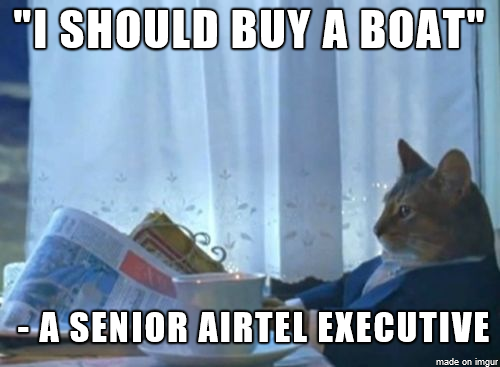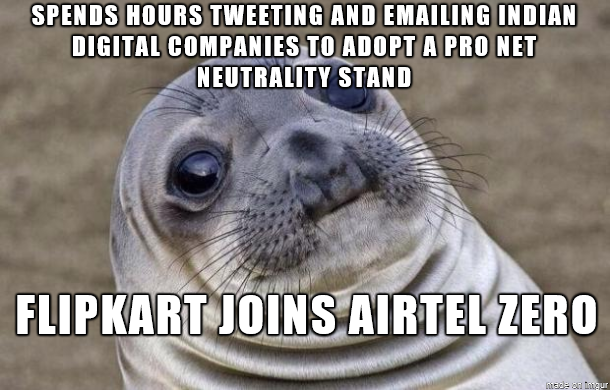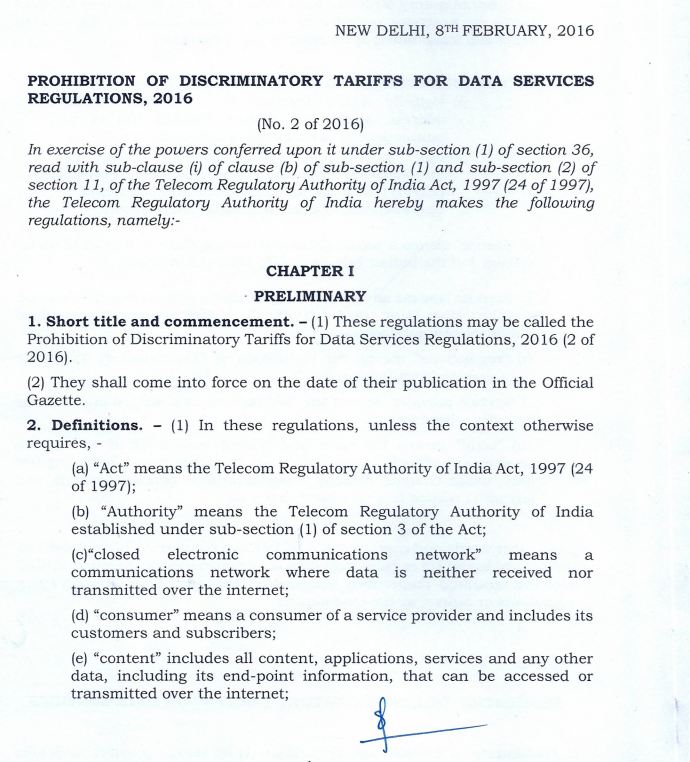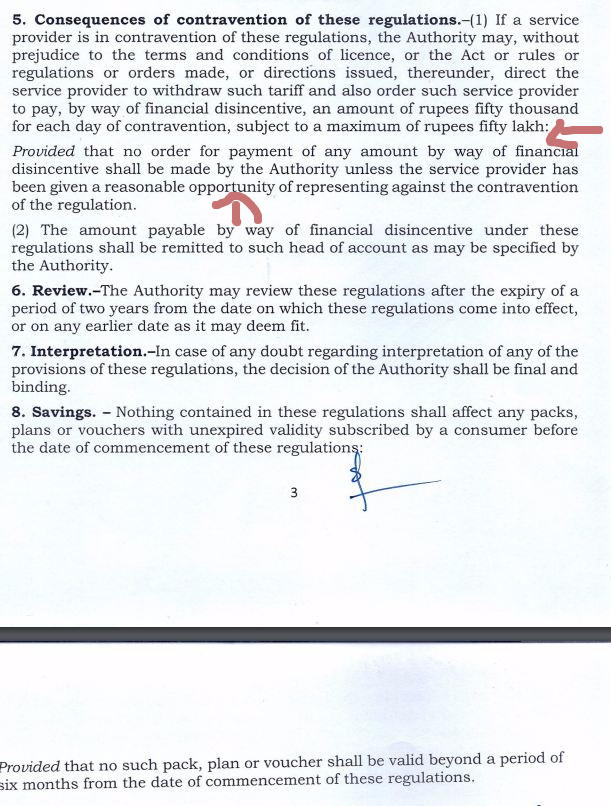Imagine what kind of an Internet you would have in India three years from now, once the Airtel Zero idea, of creating a free Internet by allowing Internet companies to buy data, becomes the norm across telecom operators. The top four telecom operators are adding around nine million mobile Internet users a quarter. India is adding around 14-15 million a quarter, and that’s around 60 million a year, probably more, with free internet. Where will the next 200 million users that will come online in India prefer to go? Will they buy a data pack, or will they use the free Internet?
Airtel Zero, which we recently wrote about, is a platform that allows Internet companies to pay money to Airtel, to allow users to get free Internet. On the face of it, for a user, this seems great. A few things to consider on how it splits the Internet:
Free and paid
What will they use? Facebook’s free Internet.org. Free Cricinfo. Maybe the free Indian Express (which calls “Net Neutrality” nonsense, here – do read the comments) instead of The Hindu or Times of India? Maybe YouTube will be free while Vimeo and Dailymotion will not be. Shopping from Flipkart at no data charges? Google, a part of the telecom lobby Cellular Operators Association of India and a serial violator of Net Neutrality in India (read this), will be free. With all the popular, favourite sites free, they’ll choose free. They’ll have to think before buying a data pack to access the freedom of the open web.
So, two Internets. Free and paid.
What will they see, when users who are on free internet try and go to a paid site? This:
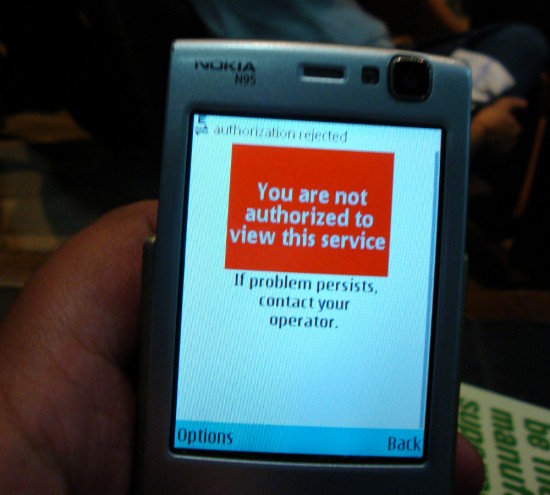
That’s what happened to me when I tried to access the open web on an ‘Airtel Live’ (not Mobile Internet) connection back in 2008.
Indian and global
When a new app launches globally, will they line up outside an Indian telecom operator's office, so that they can reach that 200-300 million users in India? Imagine if YouTube had launched now as a startup, and it wasn’t owned by net-neutrality-violating Google. Do you think they would have cared about being made available in India? Twitter – which has also violated net neutrality in India – recently launched a video streaming service Periscope. What if it isn’t available to those users on the free plan? All the small little tools that can launch globally now will not be available to that user base, because they won’t be able to roam the Internet freely.
So, two Internets: Indian and global.
What will they see, when users who are on the free Indian Internet, try to go to a global site that hasn’t signed up with a telecom operator? This:

Big and small Internet companies
Indian Internet companies will need to raise higher funding, for their sites to be made available to free users who don’t have a data plan. So, Flipkart, with $1.9 billion raised last year, will be free, but, maybe, DailyObjects with lesser funding, will not be. So the users on the free plans will never find out that DailyObjects exists, unless DailyObjects raises more funding and also signs up. What will student startups do? MediaNama was started with Rs 500 for a domain name, Rs 500 per month for hosting and our biggest expense was registration for a private limited entity. What will happen when most of the Internet in India is inside a walled garden? Will not market forces ensure that this so called “marketing expense” isn’t optional? If Flipkart has signed up, do Snapdeal or Amazon have a choice? How long will they hold out?
So, two Internets: one for the big funded companies, one for the rest.
What they see, when users who are on the free Indian Internet, try to go to a site that hasn’t signed up? This:

Between telecom operators
Now take this situation with Airtel, and replicate it across telecom operators. Different services free on different operators. Telecom operators could do exclusive deals with some sites (even though Airtel has said that it isn’t doing that now, it could, or others could), so some sites will be free only on one telecom operator, or available to those 200 million odd users from one telecom operator.
So, how many Internets? 26: Two Internets per telecom operator, and 13 telecom operators (including Jio). If ISPs also go down this path (BSNL, Airtel and MTNL are the largest), and there are over hundred ISPs, then we would have hundreds of different Internets in India. Oh, just to clarify, that isn’t a good thing.
What they see, when users who are on the free Indian Internet, try to go to a site that hasn’t signed up with their telecom operator? This:

What to expect
Maybe it won’t be as bad as this.
I’m giving you the worst case scenario. It might not be all that bad. All the telecom operators and ISP’s in India could collaborate and create a free “India Internet” that allows all apps and sites to make their product available for free across all telecom operators, maybe at a discounted rate. That still splits the Internet into two parts: free and paid. And there could be a single “Supply chain manager” (a role that exists in the mobile value added services industry) which Internet companies, Indian or otherwise, have to negotiate with to make their app available, or negotiate with every year for the renewal as a vendor with telecom operators. Is that better? I don’t know.
Telecom operators could also charge on a pay per use basis for sites outside the free Internet, and not block access, but keep in mind two things: Firstly, once that distinction is created in a user's mind between paid and free – users will lean towards free. Secondly, Indian telecom operators have a history of manipulation of their platform. In the case of Mobile Value Added Services, there is a “Supply Chain Manager” who renegotiates deals, telling “Vendors” that they’re making too much money, and more share needs to go to the operator. Where have we heard that before? Well, in the TRAI paper, the telcos argue that Internet services are “free riding” on their networks, and that have very high valuations. That $19 billion WhatsApp deal, which valued the company higher than Airtel, probably really made them angry about this “free riding”.
Technically, Airtel Zero isn’t a marketing or promotional platform. It’s platform that allows Internet companies to buy data so their consumers have to pay for it later. It is essentially subsidising Internet access. I can buy an iPhone and decide that it is available for free for anyone to take. If I don’t tell anyone about it, how will they know? The promotional aspect is separate: either the Internet company or Airtel will have to promote the services and the platform. Allowing companies to buy free access for consumers is not promotion.
Also, Airtel, in the interview with us, didn’t disclose rates, the list of companies that signed up, how this price was decided, or how different it is from what regular users pay. Srini Gopalan, Director–Consumer Business, Bharti Airtel, said, “The way our pricing structure works, the pricing is transparent, but I can’t talk to you about the details right now.” Okay, then.
Source: http://scroll.in/article/718820/Air...internet-by-bringing-in-a-digital-VIP-culture
------------------------------------------------------------------
Original Thread:
Source: http://www.medianama.com/2015/04/223-flipkart-net-neutrality-airtel/
What Is Airtel Zero?
Airtel Zero is a new platform offered by Airtel, wherein the end users will pay nothing to access some specific websites, gaming portals and ecommerce portals. There would be no data charges for those customers who opt for Zero Airtel, and chose to access only a few specific sites.
Pretty much based on the DTH model for viewing satellite TV channels, the cost of data charges used by the consumer is borne by the chosen websites and ecommerce portals.
While launching this service, Srini Gopalan, Director, Consumer Business, at Bharti Airtel said, “This is exciting for customers because a lot of their favourite apps can now be accessed without data charges, and a lot of new apps that small start-ups want to offer now become free,”
How Will It Work?
Put simply, Airtel Zero offers rich, cash stuffed Internet companies to shell out money to acquire customers. Instead of doing digital marketing in the open market, they will now directly pay to Airtel to acquire customers. A shortcut to acquire customers, at the expense of their freedom!
Assume you are an Airtel user, and you have chosen Airtel Zero platform. Now, there will be several ‘packs’ based on which you need to select your favorite websites and portals.
Assume there is a pack wherein you will be able to access Youtube, Instagram, StumbleUpon and Flipkart. Thus, when you choose this pack as the end user, you will be able to download these applications and there would be no data charge while accessing it, as it would be paid by Youtube, Instagram, StumbleUpon and Flipkart directly to Airtel.
The Problem With Airtel Zero - Freedom of choice.
You as a customer will have access to only those portals and websites which have made arrangement with Airtel. As per reports, Airtel will collaborate with 80-100 Internet companies, including top 2-3 ecommerce portals. Besides these, you won’t be able to access any website or app without paying extra and more data charges.
In case Reddit or Dailymotion decides to opt out of Airtel Zero, there is no way you can access these portals besides moving out of Airtel platform.
It’s a gross violation of Net Neutrality principle, according to which Internet service providers (Airtel here) should not discriminate against specific websites and portals and make it more favorable infront of end users. And this is what happening with Airtel Zero platform now.
Tim Berners Lee, who is regarded as the the inventor of the World Wide Web had said, “Of course, (net neutrality) is not just about blocking and throttling. It is also about stopping ‘positive discrimination’, such as when one internet operator favors one particular service over another. If we don’t explicitly outlaw this, we hand immense power to telcos and online service operators. In effect, they can become gatekeepers — able to handpick winners and the losers in the market and to favour their own sites, services and platforms over those of others. This would crowd out competition and snuff out innovative new services before they even see the light of day.”
Thus, only those websites and online services which have money to pay, will be introduced favorably infront of the end user and those who are new and without any venture will be left out.
Internet was created to remove the gatekeepers of information, and ideas. Companies like Airtel cannot handpick few portals and websites and ignore others. What if I don’t want to buy from Flipkart and don’t want to listen to Youtube?
If I am an Airtel customer, I am afraid I won’t have much choice. Flipkart and all ecommerce portals should object to such a platform which discriminates one against other.
TRAI has asked general public to share their views on the Net Neutrality principle, and we would again, strongly urge you all to write to them to save Internet and Ideas in India. More details here.
Do you think that Airtel Zero will be beneficial to the overall startup ecosystem and technological advancement which India is making right now? Do you think its ethical to discriminate one website against other by a telecom provider like Airtel? Please share your views by commenting right here.
Source: http://trak.in/tags/business/2015/04/06/flipkart-airtel-zero-ruined-neutrality-india/
More to come.. If Net Neutrality is failed.
Airtel Zero, which we recently wrote about, is a platform that allows Internet companies to pay money to Airtel, to allow users to get free Internet. On the face of it, for a user, this seems great. A few things to consider on how it splits the Internet:
Free and paid
What will they use? Facebook’s free Internet.org. Free Cricinfo. Maybe the free Indian Express (which calls “Net Neutrality” nonsense, here – do read the comments) instead of The Hindu or Times of India? Maybe YouTube will be free while Vimeo and Dailymotion will not be. Shopping from Flipkart at no data charges? Google, a part of the telecom lobby Cellular Operators Association of India and a serial violator of Net Neutrality in India (read this), will be free. With all the popular, favourite sites free, they’ll choose free. They’ll have to think before buying a data pack to access the freedom of the open web.
So, two Internets. Free and paid.
What will they see, when users who are on free internet try and go to a paid site? This:

That’s what happened to me when I tried to access the open web on an ‘Airtel Live’ (not Mobile Internet) connection back in 2008.
Indian and global
When a new app launches globally, will they line up outside an Indian telecom operator's office, so that they can reach that 200-300 million users in India? Imagine if YouTube had launched now as a startup, and it wasn’t owned by net-neutrality-violating Google. Do you think they would have cared about being made available in India? Twitter – which has also violated net neutrality in India – recently launched a video streaming service Periscope. What if it isn’t available to those users on the free plan? All the small little tools that can launch globally now will not be available to that user base, because they won’t be able to roam the Internet freely.
So, two Internets: Indian and global.
What will they see, when users who are on the free Indian Internet, try to go to a global site that hasn’t signed up with a telecom operator? This:

Big and small Internet companies
Indian Internet companies will need to raise higher funding, for their sites to be made available to free users who don’t have a data plan. So, Flipkart, with $1.9 billion raised last year, will be free, but, maybe, DailyObjects with lesser funding, will not be. So the users on the free plans will never find out that DailyObjects exists, unless DailyObjects raises more funding and also signs up. What will student startups do? MediaNama was started with Rs 500 for a domain name, Rs 500 per month for hosting and our biggest expense was registration for a private limited entity. What will happen when most of the Internet in India is inside a walled garden? Will not market forces ensure that this so called “marketing expense” isn’t optional? If Flipkart has signed up, do Snapdeal or Amazon have a choice? How long will they hold out?
So, two Internets: one for the big funded companies, one for the rest.
What they see, when users who are on the free Indian Internet, try to go to a site that hasn’t signed up? This:

Between telecom operators
Now take this situation with Airtel, and replicate it across telecom operators. Different services free on different operators. Telecom operators could do exclusive deals with some sites (even though Airtel has said that it isn’t doing that now, it could, or others could), so some sites will be free only on one telecom operator, or available to those 200 million odd users from one telecom operator.
So, how many Internets? 26: Two Internets per telecom operator, and 13 telecom operators (including Jio). If ISPs also go down this path (BSNL, Airtel and MTNL are the largest), and there are over hundred ISPs, then we would have hundreds of different Internets in India. Oh, just to clarify, that isn’t a good thing.
What they see, when users who are on the free Indian Internet, try to go to a site that hasn’t signed up with their telecom operator? This:

What to expect
Maybe it won’t be as bad as this.
I’m giving you the worst case scenario. It might not be all that bad. All the telecom operators and ISP’s in India could collaborate and create a free “India Internet” that allows all apps and sites to make their product available for free across all telecom operators, maybe at a discounted rate. That still splits the Internet into two parts: free and paid. And there could be a single “Supply chain manager” (a role that exists in the mobile value added services industry) which Internet companies, Indian or otherwise, have to negotiate with to make their app available, or negotiate with every year for the renewal as a vendor with telecom operators. Is that better? I don’t know.
Telecom operators could also charge on a pay per use basis for sites outside the free Internet, and not block access, but keep in mind two things: Firstly, once that distinction is created in a user's mind between paid and free – users will lean towards free. Secondly, Indian telecom operators have a history of manipulation of their platform. In the case of Mobile Value Added Services, there is a “Supply Chain Manager” who renegotiates deals, telling “Vendors” that they’re making too much money, and more share needs to go to the operator. Where have we heard that before? Well, in the TRAI paper, the telcos argue that Internet services are “free riding” on their networks, and that have very high valuations. That $19 billion WhatsApp deal, which valued the company higher than Airtel, probably really made them angry about this “free riding”.
Technically, Airtel Zero isn’t a marketing or promotional platform. It’s platform that allows Internet companies to buy data so their consumers have to pay for it later. It is essentially subsidising Internet access. I can buy an iPhone and decide that it is available for free for anyone to take. If I don’t tell anyone about it, how will they know? The promotional aspect is separate: either the Internet company or Airtel will have to promote the services and the platform. Allowing companies to buy free access for consumers is not promotion.
Also, Airtel, in the interview with us, didn’t disclose rates, the list of companies that signed up, how this price was decided, or how different it is from what regular users pay. Srini Gopalan, Director–Consumer Business, Bharti Airtel, said, “The way our pricing structure works, the pricing is transparent, but I can’t talk to you about the details right now.” Okay, then.
Source: http://scroll.in/article/718820/Air...internet-by-bringing-in-a-digital-VIP-culture
------------------------------------------------------------------
Original Thread:
Flipkart, which raised $1.91 billion in funding last year, has signed up with Bharti Airtel, India’s largest telecom operator, four highly placed sources have confirmed to MediaNama.
Airtel has confirmed that it is launching a platform called Airtel Zero, in order to allow companies to buy data to offer their apps to consumers for free.
Zero Rating violates Net Neutrality, something which the Telecom Regulatory Authority of India has acknowledged in its consultation paper announced last week (paper, FAQs), which may end up in a licensing regime for Internet companies, or allow telecom operators to do traffic shaping – slow down or speed up certain services, make some expensive versus others, or slice the Internet into types of services, rather than offer access to the Internet as a whole.
Sachin Bansal, founder and CEO of Flipkart, declined to respond to the following questions:
1. Does Flipkart have exclusivity in the shopping/ecommerce category in this Zero Rating deal with Airtel?
2. Has Flipkart closed similar deals with any other telecom operator?
3. Is Flipkart in talks with any other telecom operator for similar deals?
4. Is there any preferential bandwidth allocation as a part of this deal? As in, will specific bandwidth speeds be allocated to Flipkart, so that access to Flipkart is faster than it is ecommerce/shopping apps or sites?
5. Does this deal involve any throttling of other ecommerce sites or apps? As in, will other ecommerce sites or apps be slowed down by Airtel so that the Flipkart app appears faster?
6. What is the price being paid by Flipkart, on a per MB basis, to Airtel, for making Flipkart free?
7. Is this a part of the Airtel OneTouch Internet access gateway?
8. We’ve further heard from sources that Flipkart is paying Airtel Rs 1000/gb data transfer for this deal. Would appreciate if you could confirm or deny this figure. If incorrect, would appreciate if you could share the actual figure.
Source: http://www.medianama.com/2015/04/223-flipkart-net-neutrality-airtel/
What Is Airtel Zero?
Airtel Zero is a new platform offered by Airtel, wherein the end users will pay nothing to access some specific websites, gaming portals and ecommerce portals. There would be no data charges for those customers who opt for Zero Airtel, and chose to access only a few specific sites.
Pretty much based on the DTH model for viewing satellite TV channels, the cost of data charges used by the consumer is borne by the chosen websites and ecommerce portals.
While launching this service, Srini Gopalan, Director, Consumer Business, at Bharti Airtel said, “This is exciting for customers because a lot of their favourite apps can now be accessed without data charges, and a lot of new apps that small start-ups want to offer now become free,”
How Will It Work?
Put simply, Airtel Zero offers rich, cash stuffed Internet companies to shell out money to acquire customers. Instead of doing digital marketing in the open market, they will now directly pay to Airtel to acquire customers. A shortcut to acquire customers, at the expense of their freedom!
Assume you are an Airtel user, and you have chosen Airtel Zero platform. Now, there will be several ‘packs’ based on which you need to select your favorite websites and portals.
Assume there is a pack wherein you will be able to access Youtube, Instagram, StumbleUpon and Flipkart. Thus, when you choose this pack as the end user, you will be able to download these applications and there would be no data charge while accessing it, as it would be paid by Youtube, Instagram, StumbleUpon and Flipkart directly to Airtel.
The Problem With Airtel Zero - Freedom of choice.
You as a customer will have access to only those portals and websites which have made arrangement with Airtel. As per reports, Airtel will collaborate with 80-100 Internet companies, including top 2-3 ecommerce portals. Besides these, you won’t be able to access any website or app without paying extra and more data charges.
In case Reddit or Dailymotion decides to opt out of Airtel Zero, there is no way you can access these portals besides moving out of Airtel platform.
It’s a gross violation of Net Neutrality principle, according to which Internet service providers (Airtel here) should not discriminate against specific websites and portals and make it more favorable infront of end users. And this is what happening with Airtel Zero platform now.
Tim Berners Lee, who is regarded as the the inventor of the World Wide Web had said, “Of course, (net neutrality) is not just about blocking and throttling. It is also about stopping ‘positive discrimination’, such as when one internet operator favors one particular service over another. If we don’t explicitly outlaw this, we hand immense power to telcos and online service operators. In effect, they can become gatekeepers — able to handpick winners and the losers in the market and to favour their own sites, services and platforms over those of others. This would crowd out competition and snuff out innovative new services before they even see the light of day.”
Thus, only those websites and online services which have money to pay, will be introduced favorably infront of the end user and those who are new and without any venture will be left out.
Internet was created to remove the gatekeepers of information, and ideas. Companies like Airtel cannot handpick few portals and websites and ignore others. What if I don’t want to buy from Flipkart and don’t want to listen to Youtube?
If I am an Airtel customer, I am afraid I won’t have much choice. Flipkart and all ecommerce portals should object to such a platform which discriminates one against other.
TRAI has asked general public to share their views on the Net Neutrality principle, and we would again, strongly urge you all to write to them to save Internet and Ideas in India. More details here.
Do you think that Airtel Zero will be beneficial to the overall startup ecosystem and technological advancement which India is making right now? Do you think its ethical to discriminate one website against other by a telecom provider like Airtel? Please share your views by commenting right here.
Source: http://trak.in/tags/business/2015/04/06/flipkart-airtel-zero-ruined-neutrality-india/
More to come.. If Net Neutrality is failed.
Last edited:




